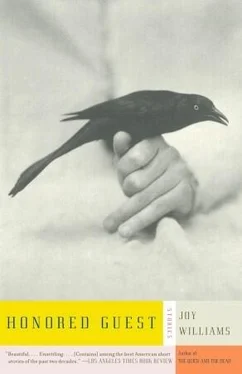Her mother was watching television with the sound off when Helen got home. “That’s a nice haircut,” her mother said. “Now don’t touch it, don’t pull at it like that for godssakes. It’s pretty. You’re pretty.”
It was a ghastly haircut, really. Helen’s large ears seemed to float, no longer quite attached to her head. Lenore gazed quietly at her.
“Mom,” Helen said, “do you know there’s a patron saint of television?”
Lenore thought this was hysterical.
“It’s true,” Helen said. “St. Clare.”
Lenore wondered how long it would take for Helen’s hair to grow back.
Later they were eating ice cream. They were both in their nightgowns. Helen was reading a Russian novel. She loved Russian novels. Everyone was so emotional, so tormented. They clutched their heads, they fainted, they swooned, they galloped around. The snow. Russian snow had made Maine snow puny to Helen, meaningless.
“This ice cream tastes bad,” her mother said. “It tastes like bleach or something.” Some foul odor crept up her throat. Helen continued to read. Anyway, what were they doing eating ice cream in the middle of winter? Lenore wondered. It was laziness. Something was creeping quietly all through her. She’d like to jump out of her skin, she would.
“You now,” she said, “I believe that if Jesus walked into this house this minute, you wouldn’t even raise your eyes.”
Helen bit her lip and reluctantly put down the book. “Oh, Mom,” she said.
“And maybe you’d be right. I bet he’d lack charisma. I’d bet my last dollar on it. The only reason he was charismatic before was that those people lived in a prerational time.”
“Jesus isn’t going to walk in here, Mom, come on,” Helen said.
“Well, something is, something big. You’d better be ready for it.” She was angry. “You’ve got the harder road,” she said finally. “You’ve got to behave in a way you won’t be afraid to remember, but you know what my road is? My road is the new road.”
Like everyone, Lenore had a dread of being alone in the world, forgotten by God, overlooked. There were billions upon billions of people, after all, it wasn’t out of the question.
“The new road?” Helen asked.
“Oh, there’s nothing new about it,” Lenore said, annoyed. She stroked her own face with her hands. She shouldn’t be doing this to Helen, her little Helen. But Helen was so docile. She wasn’t fighting this! You had to fight.
“Go back to what you were doing,” Lenore said. “You were reading, you were concentrating. I wish I could concentrate. My mind just goes from one thing to another. Do you know what I was thinking of, did I ever tell you this? When I was still well, before I went to the doctor? I was in a department store looking at a coat and I must have stepped in front of this woman who was looking at coats too. I had no idea … and she just started to stare at me. I was very aware of it but I ignored it for a long time, I even moved away. But she followed me, still staring. Until I finally looked at her. She still stared but now she was looking through me, through me, and she began talking to someone, resuming some conversation with whoever was with her, and all the while she was staring at me to show how insignificant I was, how utterly insignificant …” Lenore leaned toward Helen but then drew back, dizzy. “And I felt cursed. I felt as though she’d cursed me.”
“What a weirdo,” Helen said.
“I wonder where she picked that up,” Lenore said. “I’d like to see her again. I’d like to murder her.”
“I would too,” Helen said. “I really would.”
“No, murder’s too good for that one,” Lenore said. “Murder’s for the elect. I think of murder … sometimes I think I wish someone would murder me. Out of the blue, without warning, for no reason. I wouldn’t believe it was happening. It would be like not dying at all.”
Helen sat in her nightgown. She felt cold. People had written books about death. No one knew what they were talking about, of course.
“Oh, I’m tired of talk,” Lenore said. “I don’t want to talk anymore. I’m tired of thinking about it. Why do we have to think about it all the time! One of those philosophers said that Death was the Big Thinker. It thinks the instant that was your life, right down to the bottom of it.”
“Which one?” Helen asked.
“Which one what?”
“Which philosopher?”
“I can’t recall,” Lenore said. Sometimes Helen amused her, she really amused her.
Lenore didn’t dream that night. She lay in bed panting. She wasn’t ready but there was nothing left to be done. The day before the girl had washed and dried the bedsheets and before she put them on again she had ironed them. Ironed them! They were just delicious, still delicious. It was the girl who loved to iron. She’d iron anything. What’s-her-name. Lenore got up and moved through the rooms of the house uncertainly. She could hardly keep her balance. Then she went down into the cellar. Her heart was pounding, it felt wet and small in her chest. She looked at the oil gauge on the furnace. It was a little over one-quarter full. She wasn’t going to order any more, she’d just see what happened. She barely had the strength to get back upstairs. She turned on the little lamp that was on the breakfast table and sat in her chair there, waiting for Helen. She saw dog hairs on the floor, gathering together, drifting across the floor.
Helen felt sick but she would drag herself to school. Her throat was sore. She heated up honey in a pan and sipped it with a spoon.
“I’m going to just stay put today,” Lenore said.
“That’s good, Mom, just take it easy. You’ve been doing too much.” Helen’s forehead shone with sweat. She buttoned up her sweater with trembling fingers.
“Do you have a cold?” her mother said. “Where did you get a cold? Stay home. The nurse who’s coming this afternoon, she can take a look at you and write a prescription. Look at you, you’re sweating. You’ve probably got a fever.” She wanted to weep for her little Helen.
“I have a test today, Mom,” Helen said.
“A test,” Lenore marveled. She laughed. “Take them now but don’t take them later, they don’t do you any good later.”
Helen wiped at her face with a dish towel.
“My god, a dish towel!” Lenore said. “What’s wrong with you? My god, what’s to become of you!”
Startled, Helen dropped the towel. She expected to see her face on it almost. That was what had alarmed her mother so, that Helen had wiped off her own face. Anyone knew better than to do that… She felt faint. She was thinking of the test, of taking it in a few hours. She took a fresh dish towel from a drawer and put it on the rack.
“What if I die today?” Lenore said suddenly. “I want you to be with me. My god, I don’t want to be alone.”
“All this week there are tests,” Helen said.
“Why don’t I wait then?” Lenore said.
Tears ran down Helen’s cheeks. She stood there stubbornly, looking at her mother.
“You were always able to turn them on and off,” Lenore said, “just like a faucet. Crocodile tears.” But with a moan she clutched her. Then she pulled away. “We have to wash these things,” she said. “We can’t just leave them in the sink.” She seized the smudged glass she’d used to swallow her pills and rinsed it in running water. She held it up to the window and it slipped from her fingers and smashed against the sill. It was dirty and whole, she thought, and now it is clean and broken. This seemed to her, profound.
“Don’t touch it!” she screamed. “Leave it for Barbara. Is that her name, Barbara?” Strangers, they were all strangers. “She never knows what to do when she comes.”
Читать дальше












